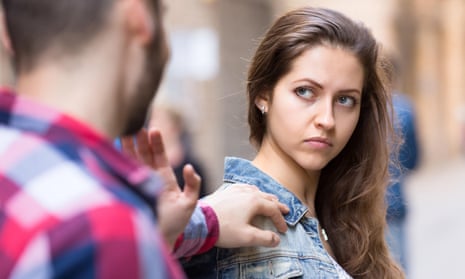It’s usually possible to tell when it’s about to happen. The signal could be a set of dull eyes staring out from the middle of a group of teenage boys. Or a brief smirk. Could be from a man in a suit, could be from someone looking like a grandad. Sometimes there’s no warning, just the prickling sixth sense of “I’m about to be told how my tits are looking today by a complete stranger”.
“Catcalling” is exasperating and humiliating, but something to be lived with if you’re female and you go outside a lot. Racism, ableism, homophobia and transphobia often get mixed into the cocktail of abusive comments, too, and as Noa Jansma’s @dearcatcallers project showed, they come from all ages and all classes. We recipients live with it, because of course we do. There is far worse than words for us to live through out there – #MeToo can show you a sample (only from women of certain economic backgrounds lucky enough to have an internet connection of course). Yet, strangely, a peaceful acceptance of street harassment as “only words” is something I’m yet to feel.
Instead, each unprompted “slut” or “ugly dyke” from people I’ve never met causes embarrassment, irritation, but mostly anger within me. And it’s an anger that doesn’t bleed out; it builds. Latest example (which I’ll forget as new ones replace it): last week in Houston, a man was offering his opinion on each woman who walked by him. One in front of me was told she had a “nice ass”, I was called a “bitch”. I turned around and advanced on him, startled he grabbed at my forearms and babbled excuses. I yelled for him to get his damn hands off of me, until he let go and swiftly left the area, visually resentful.
Despite enjoying humiliating people who try to do the same to me first (I’m a “bitch”, remember), it’s no real outlet for the humiliation of street harassment – it’s a stupid and reckless thing to do. I know that, because everyone who has been catcalled knows that. The words of street harassment fall on a spectrum of disrespect. Violence could follow any insult or sexual comment, yelled or whispered, from a stranger on the street. The words are merely an opening parry, or a hint of how little your rights, or very existence, are respected. Women are still being hurt by people who hate them, everywhere.
The words are nothing compared with what they could be, but are also a reminder of that. They’re intended that way: a smug reminder, a smirking warning – don’t get too comfortable in your life. Don’t think you’re entirely safe out here; you aren’t. The actual message, and motive, behind street harassment is quiet and assured, and that’s why it’s so grating and tiring. Because we already know.
#MeToo is still so dissonant. Is sexual assault, violence, rape culture and ingrained misogyny actually being recognised, openly and honestly, as wrong at last? Are missing stairs not being stepped around any more?
More familiar and less confusing is Bryan Cranston commenting that there’s “room down the road” for forgiveness of outed abusers like Harvey Weinstein; that’s to be expected. Also predictable – Jennifer Garner’s assertion that it’s women who need to be “more of a force” to stop assault. Saturday Night Live and Lena Dunham’s “but my friend wouldn’t do that”-style silencing statements aren’t surprising, either. Women are more used to excuses like this than to being listened to. They’re symptoms of a sexist status quo being protected – whether Bryan, Jennifer, Lena, and their cohorts realise that or not.
Catcallers and street harassers, however, know they’re maintaining a system of sexism – it’s the motive, and that’s why it angers me so much. In 2015 a survey by Cornell University and the anti-harassment campaign Hollaback! on street harassment found that an international average of 84% of women have been victims of street harassment between the ages of 11 and 17. The 2014 Stop Street Harassment survey also featured some scary (but unsurprising, if you’ve experienced it) statistics of women being “reminded”.
In light of #MeToo, will the upcoming US-based survey report lower numbers of street harassment? Probably not – not yet. I suspect harassers will be offering more messages of the misogyny that still exists in the world for a while. But that’s a signal too – that change is coming, and they know it.

